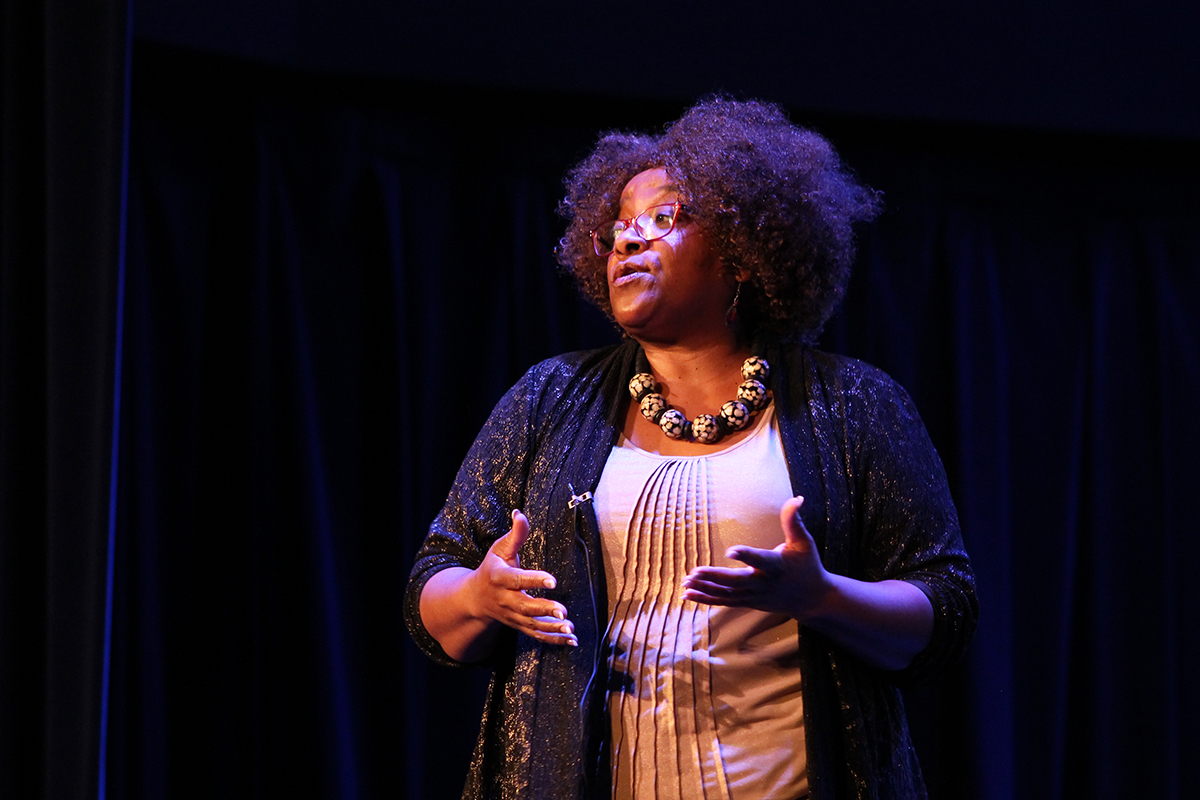Human rights advocate provides insight on how to heal the wounds of racism
Naomi Tutu discusses the Truth and Reconciliation Commission and seeking a future without hate
More stories from Jessie Meyen
Photo by Sam Farley
Naomi Tutu shares stories of the Truth and Reconciliation Commission (TRC) Tuesday evening in Schofield Auditorium. Her father, Desmond Tutu, served as the chairman for the TRC.
A human rights activist originally from South Africa visited UW-Eau Claire Tuesday evening to talk about the racism during and after the apartheid in her home nation and the role the Truth and Reconciliation Commission (TRC) played in healing those wounds.
“My hope for us is that we can look at ourselves and ask how we can allow ourselves to label someone as something less than we are,” Naomi Tutu said.
About 420 community members filled the chairs of the Schofield Auditorium to hear Tutu’s experiences in South Africa and how she plans to translate them across the ocean to in United States.
Tutu’s father, Nobel Peace Prize winner and chairman of the TRC, Desmond Tutu, was the reason activism came so easily to her. Since she was a little girl she’s been attending and even catering the TRC meetings in her own household.
The TRC was an organization formed following the apartheid to help deal with the human rights abuses that occurred during that time period.
She began by diving right into the history of the TRC in Cape Town, South Africa and gave an in-depth description of the two main perspectives on human rights that were developed following the end of the apartheid.
Tutu said people either wanted to give others a clean slate for a fresh start, or they wanted to put the offender on a trial to pay for their injustices. These two perspectives formed the Amnesty Committee and the Human Rights Violations Committee.
To receive amnesty, Tutu said, the perpetrator had to do three things: Prove their actions were politically motivated, make a connection between their aims and their action and tell the truth. Only then could the perpetrator walk out jail-free. Even with these seemingly simple tasks, Tutu said people still were not receiving amnesty.
“I kept struggling with this until I realized that the hearings were public,” Tutu said. “People didn’t want their family and friends to know they were a part of the secret police (torture squads). They didn’t want them to know how deep they had sunk.”
Though she was just a young girl she came to the realization humans have lows they can sink to and highs they can rise to, no matter how good or bad the person seems.
“The biggest lesson I learned from the TRC is that you can’t pick and choose your history,” Tutu said. “Slavery is more than just a paragraph in our nation’s history.”
Saudamini Agarwal, a junior involved in a staff activity for The Forum + Artists Series, said she loved the sense of reflection she got from Tutu.
“The most powerful thing is looking at ourselves,” Agarwal said. “We need to be honest and (as Tutu put it) own all of our history.”
Nicole Brown, a Eau Claire graduate who studied abroad in South Africa said Tutu’s message is what the U.S. needs to hear.
“I could hear hope in her speech,” Brown said. “I witnessed South Africa embracing their past and future. Our country needs to do the same — more now than ever.”
Tutu said she plans to take her father’s advice and continue to pray and be a person of courage.
“I hope that some of the teachings strike a chord with you,” Tutu said. “I hope they make you think about the issues that divide this community, and maybe you’ll be the next place for TRC.”











